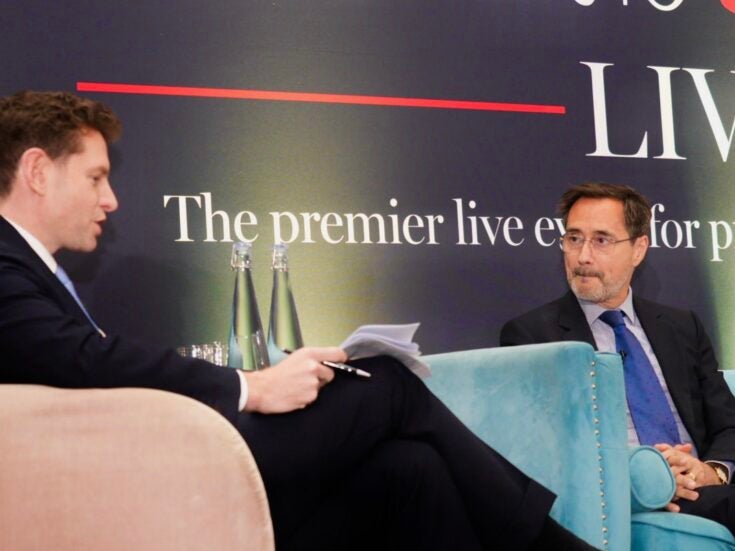
Entertaining clients has long been part and parcel of banking. But who would have
thought having fun could be such serious business? By Caroline Allen
‘It’s all been done already,’ sighs one marketing consultant when asked about the marketing initiatives that private banks and hedge fund managers use to draw in the high-net-worths. ‘The golf days, the tennis at Wimbledon, the opera and theatre premieres… the obvious entertainments have all been exhausted.’
The rationale behind these increasingly extravagant experiences – ‘event’ doesn’t quite have the required patina – is that they will prompt a potential client to think: ‘Now this is the bank I want to be with – my kind of people, great service, ahead of the game. My money is safe with them’.
Almost every week, one or other of the leading banks is throwing serious money at VIP clients or potentials in the hope of luring new business. The other week I heard that one top league private bank had spent £200,000 flying top lawyers in London to the Villa D’Este on Lake Como (where Barclays Wealth annually host their flag-ship VIP client event in the autumn) for a glittering two-day bonanza event in the hope of getting more private client ‘referrals’.
But it is UBS that have really rocked the client hospitality boat with their range of events, including an invite for an opening at Tate Modern in London and flying their A-list clients First Class to Miami for Art Basel Miami Beach, where they are put up at the Ritz–Carlton and given a special UBS VIP pass which gets them invited to all of the chic private soirées hosted by Miami’s art collector and society hostesses.
The only problem with this generosity, however, is that some clients – i.e the one’s invited to cross the Thames rather than the Atlantic – end up thinking they are on the UBS C–list.
In some cases this social grading of supposed much valued clients has led to defections. ‘I’ve seen that with people who bank with the big Swiss banks’ says Peter Charrington, managing director of Citigroup Private Bank in the UK. ‘I have had a couple of customers come to me and they were disappointed to be treated like that.
‘We are a very different organisation to the Swiss banks who will bank anybody from £100,000 onwards. The client that we’re looking after is joining a much more exclusive club. So when I do an event, I don’t open it only to key clients – it’s open to all our clients, because all of our clients have to be key clients. The whole point of turning up to these events is to network and talk to people. I think we do some truly fabulous events.’
These include an exclusive golf tournament with Tiger Woods and Ernie Els in Florida where key clients are put up at a top hotel, get to play with the players and have dinner and breakfast with them. Charrington also takes clients to boxes at the theatre and ballet. He does a four-day car event in Monaco. What he never does are en masse events, such as hiring the Royal Academy for a drinks party.
‘We did a shoot recently on a beautiful estate called Enkham, in Dorset’ he adds. ‘We went with Charlie McVey, chairman of the Investment Bank–Private Bank Partnership, and 16 clients and their partners.
‘But that is exceptionally small. At the other end of the spectrum I am taking some clients to the James Bond premiere – it’s black tie, the money goes to charity. That’s a great way to entertain a client who doesn’t like cars, golf or the ballet.’
The banks maintain that every single potential customer is uniquely important and precious to them. It seems as if they are hardly selling at all: merely mixing new with old and trusted friends.
However, the commercial reality is colder: existing and potential clients are graded seasonally, like so many tobacco leaves for texture, richness, aroma, gloss, and taste. It’s called segmentation in the industry parlance. A decidedly clinical dissection of client databases throws up the potential of a set of existing or referred contacts.
Teams of organisers sit in the upper ranks of most private banks conjuring up diverting occasions to attract these targets. They have a razor-sharp instinct for who sits where on the rich lists, who is moving up, down or out; a genius for the minutiae of logistics and for the smooth handling of exacting superiors.
The culture of their bank is in their blood, and their eyes glint and narrow at the mention of anyone else’s, even if they keep smiling. They are bred to host and do it very well.
Alison Petit, neé Barnes, who picked up the Rising Star award from Management Today magazine earlier this year, is a shining example of this. Her formative years, spent at lawyers Clifford Chance and Simmonds & Simmonds, have given her a crispness of organisation and understanding which is the talk of the business.
Having built a formidable reputation at Barclays Wealth Management as business director of marketing services, she is now the marketing director for Rothschild Private Management. Her approach is incisive: decide on segmentation and then build promotional events around target groups.
One of the most crucial of these, at the moment, is the female demographic. By 2025, women are expected to own more than 60 per cent of the UK’s personal wealth. This trend is reflected worldwide: women in North America comprise 43 per cent of the affluent segment and their numbers are growing twice as fast as men; in Saudi Arabia, the largest wealth market in the Middle East, women already command 40 per cent of private fortunes.
Events directed at male clients have, of course, been a feature of private banking and wealth management for generations. But, while these days gender segregation may seem outdated to any well-adjusted social animal, it’s still ubiquitous. A box at Lord’s, or a chance to get oiled up over an F1 bumper with Michael Schumacher might appeal to male clients, but events targeted at women are bound to look rather different.
Rothschild has a gamut of gallery openings, shows and parties, but the A-list might get flown out, in extremely carefully-assembled groups of four or five, to the Rothschild family chateau in France for wine tasting with Baron Eric. Bramdiva, offspring of Nicola Horlick’s Bramdean Asset Management, organises evenings of entertainment (trying on jewellery), business networking and personal pampering.
Similarly, Citigroup Private Bank recently put on a diamond event with Sotheby’s in Athens, although in Peter Charrington’s experience the gender divide is not so strict. ‘We had one client who didn’t like golf but whose wife loved the idea of being put up at our expense at the Ritz-Carlton, which is a beautiful hotel, so they came to the tournament anyway.’
Coutts has a dedicated website and head of corporate marketing there, Julie Hurcomb, organises a range of happenings, from meeting fashion designers such as Stella McCartney or Alice Temperley, who staged a show at the Coutts’ offices in the Strand, to ladies’ race days and charity events.
Women, it seems, are particularly good at referring their friends, if they consider the bank trustworthy. The popular image of a wealthy widow who has never had to sign a cheque may still be true in rare instances, but it is giving way to programmes directed at a new generation of female entrepreneurs who are perfectly willing to conduct beauty parades with the world’s finest asset managers competing.
And then there are the children. Generation Y, the progeny of the baby-boomer Generation X, are set to become the wealthiest in history, and they need help understanding what they have to play with. Institutions like JP Morgan Private Bank are ready to offer it through a set of three multi-site educational programmes dubbed NextGen Leadership, which cover topics such as Sustaining the Family Enterprise.
It is no secret that the entertainment agendas tend to reflect the personal pleasures of the organisers or their bosses. Merrill Lynch’s Stuart McGregor is a polo fanatic and has gathered half a dozen other enthusiasts in the firm to host tournaments for a loyal core of 70 client families who also love the game.
Coutts’ Perry Littleboy, in charge of the bank’s business development, is a serious fly fisherman: expect the finest stretches of Scottish water to welcome clients he is keen to woo. Pictet’s managing partners and directors love Gstaad. The firm took over the entire Palace Hotel for its most recent bi-annual get-together with clients.
The skill required to organise such sensitive agendas should not be underestimated. HNW individuals are used to having exactly what they want. They turn down a lot of invitations, for all sorts of reasons. The event may be considered tedious; they may be tired, bored or fed up; they know the venue or other guests too well, or not well enough.
They get a better invitation, or they feel they won’t have a good time. Add in the other social hazards: being cooped up with people you don’t like, who may be richer/poorer or cleverer/duller than you, whose wives or husbands you cannot stand, and, horror of horrors, in circumstances where you might be accosted by a salesman.
Social snobbery is often not a reflection of actual worth: one (quite modestly bequeathed) heiress commented, ‘Who wants to spend the day with a bunch of dentists?’
‘You have to compose the guest lists very carefully,’ says one marketing guru. ‘Of course, you wouldn’t invite them unless you know they are going to accept. You have to make sure they are available before you ask. It’s a tricky business sometimes.’
The great danger is that having been offered one unappealing invitation, the guest will not even bother to open the envelope containing the next one. Your prospect is dead.
Such a concentrated marketing agenda needs some serious financial backing, and the entertainment budgets of the private banks are ‘sufficient’, as one director said, adding hurriedly that the private banking divisions of investment banks ultimately have to answer to shareholders.
‘It is not a question of throwing money at it. It is a matter of what works.’ True, but a certain level of spending is required to generate any momentum at all. £1 million-a-throw is not unusual.
Gatherings of hundreds, or even dozens, however rich, are decidedly not exclusive. Picnics in the outer meadows at Glyndbourne may sound ritzy to your friends at the county sports club, but you are cattle class, unless you are near the Grange. Salzburg and other foreign locations may bump you up the rankings a little, but only provincials are dazzled by international travel.
The bigger bashes are generally targeted at the lower end of the wealth spectrum: that is, at guests with perhaps £1-£2 million to commit. ‘You invite 200, and you may get 15 client enquiries from it, and of those, half a dozen come through,’ says one director.
‘But further up the scale, it is extremely difficult to spark interest in anything like that. Those clients are just not going to accept a mass invitation. The maximum they would expect in a group would be ten, and they want the principal [a bank’s owner or executive] to be there.’
Most private banks are keen not to appear to be buying clients, and there is some debate among organisers as to the merit of obliging guests to fund at least part of the junkets. Some insist that guests pay for their own flights, since the cost is likely to be immaterial to them.
Britain’s oldest private bank, Hoare’s, commemorated its 333rd anniversary by inviting some 1,700 existing clients to a special showing of Mary Poppins at the Prince Edward theatre in London. There were customised umbrellas on offer; children’s moneyboxes filled with chocolate coins; books on the history of the bank; plus a black-tie dinner for the top-tier 150 guests at the bank’s Fleet Street offices afterwards. A delightful, if quaint, offering, one might think. The bank’s clients loved it: no celebrity glitz and razzamatazz, just good, clean, genuine fun.
In the pecking order of appeal, meeting top names and networking comes way ahead of anything else. It sounds good to offer something academic, but watch how long guests actually stay to listen to that INSEAD professor before they repair to the après-symposium bar. Wealthy clients like to have fun. Serious investors are interested in real knowledge, new expertise and financial opportunity, but most have advisors to worry about it for them.
Art events – where Kleinwort Benson Private Bank are making in-roads with their sponsorship of Sudeley Castle art-installation exhibition – have a certain cachet because they suggest cultural self-improvement and intellectual standing, and collecting is a good way to go through impressive amounts of money quite quickly.
Invitations to the Freize Art Fair (a Deutsche Bank favourite), among others, rank high on the desirability scale. But as these have opened up, previews, and indeed previews of previews, have sorted out those merely welcome from those truly personally invited.
Catering provides another benchmark of perceived value. If you have been bidden to the mid-afternoon opening of an exhibition or the launch of a new sports car, or to any sort of half-meal – ‘tea’, for example – or cocktails, you are B-list. If the host won’t stand you a full meal, plus some very good liquor, you are already travelling economy.
Much of the private banking entertainment scene keeps to the old ‘hunting, shooting, fishing’ cliché. Many see this as the prime example of unassailable exclusivity because there is no space for either client or host to hide. What you thought was going to be a convivial day out can quickly become a masochistic exercise in social humiliation.
‘You can get all the gear,’ explains one organiser ‘but if you are a poor shot and don’t know how to behave, the guns – and their wives, beaters and dogs – can spot it a country mile off.’ Sailing is even more rife with potential social hazards. Even on a large yacht, a few days will cruelly expose any shortcomings, and so an invitation to sail, especially if you are crewing, is to be accepted with caution.







